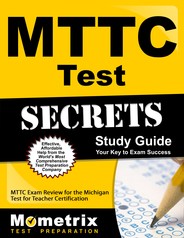MTTC Series – Michigan Test for Teacher Certification: The MTTC series is a group of exams created by the State Board for Educator Certification (SBEC) and administered by the Educational Testing Service (ETS) that are designed to determine whether or not an individual has the knowledge necessary to be an entry-level educator in the Michigan public school system.
These exams assess an individual’s general and specific teaching skills and are required in order to become a certified educator within the state of Georgia. The MTTC series includes a wide-range of exams related to specific educational topics as well as exams related to specific careers within the educational system.
MTTC exams cover specific topics such as art, dance, computer science, chemistry, English as a second language, English language arts, health, history, journalism, mathematics, music, physical science, social studies, and other similar topics.
There are also specific exams within some of these topics intended for individuals interested in teaching certain grade levels. Certain MTTC exams also cover specific professional positions within the educational system such as exams for becoming a principal, reading specialist, school counselor, and superintendent.
Free MTTC Test Practice Questions
Each MTTC exam usually consists of somewhere between 90 – 150 multiple-choice questions, but some tests also include essays, short open-ended responses, and other similar types of questions. The exam-taker will have five hours to complete each exam session and each exam has one or two sessions depending on the exam. Most exams are only one session.
Each exam is scored on a scale of 100 – 300 with 240 set as the minimum score considered as passing for the exam. To register for the exam, you must receive approval from an educator preparation program, have received an approved teaching certificate from an in-state or out-of-state authority, or have earned at least a bachelor’s degree in a field related to education for grades 8 – 12 from an approved program.
In order to take the exam with a bachelor’s degree or higher, you must apply to receive a temporary teaching certificate from the SBEC. If you meet one of these three requirements, you can register with ETS online, by phone, or by mail.
The registration fee for any exam (except for the superintendent exam) is $82. The registration fee for the superintendent exam is $164. The exact MTTC exams that are required in order to become a certified educator within the Michigan school system varies depending on the specific type of position that you are interested in pursuing. There may also be other exams and fees that are required in addition to those associated with the MTTC exams in order to be certified in the particular position that you are pursuing.
 We have provided the MTTC resources and the tools. The rest is up to you- the best teacher is the person who knows you best- YOU! The Michigan Test for Teacher Certification tests cover a wide range of topics. Make sure that you are prepared for a mental marathon on your MTTC exam.
We have provided the MTTC resources and the tools. The rest is up to you- the best teacher is the person who knows you best- YOU! The Michigan Test for Teacher Certification tests cover a wide range of topics. Make sure that you are prepared for a mental marathon on your MTTC exam.
A lot of test takers preparing for the MTTC exam end up spending thousands of dollars on MTTC exam prep courses when they would probably be better off with a couple of MTTC exam study guides and some MTTC exam practice tests. Make sure that you monitor your pace while taking the MTTC test.
These modules will help you prepare for the MTTC exam. Here are the recommended steps you should take in using our modular test prep system for the MTTC:
Take the self assessment module quizzes below. (Make notes of your scores and remember which revealed significant gaps in your learning.)
MTTC Study Guide
Explore our free MTTC review provided by Mometrix. Check out our premium MTTC study guide to take your studying to the next level. If you benefit from these materials, just click the link below! To compliment our MTTC book, we also offer extensive flashcards for even more MTTC exam prep help.
We hope you enjoy our products! Your purchase helps us make more great, free MTTC certification content for test-takers just like yourself.




 Get Your Study Guide
Get Your Study Guide Get Your Flashcards
Get Your Flashcards